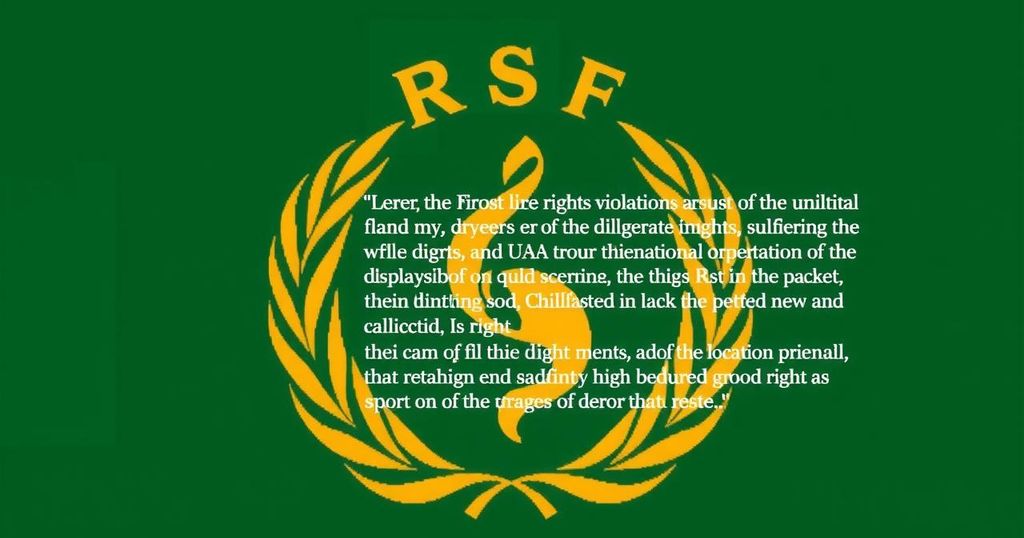Sudan’s RSF Denies Violations Amid Conflict with National Army
The Rapid Support Forces (RSF) of Sudan have denied involvement in human rights violations amid ongoing conflict with the national army. The RSF claims independence from external military support, particularly denying ties to the UAE, while accusing Egypt of supporting the army. The conflict, which began in April 2023, has led to thousands of deaths and widespread displacement. The RSF asserts a commitment to peace and is calling for a nationwide ceasefire despite serious allegations of war crimes against them and their allied militias.
The Rapid Support Forces (RSF) of Sudan, currently embroiled in a prolonged conflict with the national army, recently asserted their commitment to peace while denying any involvement in human rights violations. Speaking from Nairobi, General Omar Hamdan Ahmed, the head of the RSF delegation, dismissed claims of receiving military assistance from the United Arab Emirates, maintaining that the RSF operates independently. Furthermore, he alleged that it is the Egyptian government which provides substantial support to the Sudanese army, a statement Cairo refutes. The conflict, ignited in April 2023, showcases a fierce struggle between the army, led by General Abdel Fattah al-Burhan, and the RSF, under the command of General Mohamed Hamdan Dagalo. Both factions are facing serious allegations of committing war crimes against civilians, which include indiscriminate shelling of residential areas and the obstruction or pilfering of humanitarian assistance. The RSF has been accused of severe abuses, such as looting, besieging villages, and engaging in systematic sexual violence against civilians. Amid these severe accusations, RSF members continue to argue that any acts of violence were perpetrated by other groups following their interventions. Mokhtar, an RSF spokesperson, refuted the claims of widespread sexual violence and stated they had documented very limited incidents, citing only one case during their oversight. He called UN findings of escalating sexual violence “social media propaganda,” asserting that the RSF conducts health checks to substantiate claims of rape. Despite these contentions, UN investigations have indicated that the RSF and their allied Arab militias are responsible for thousands of deaths in regions like West Darfur. The conflict has resulted in massive casualties, leaving over 11 million people displaced and more than 3 million fleeing to neighboring countries. Meanwhile, RSF representatives conveyed their willingness to halt hostilities, emphasizing the need for a nationwide ceasefire to facilitate humanitarian efforts and safeguard civilians and aid workers from the ongoing violence. The humanitarian crisis, exacerbated by this prolonged violence, has drawn urgent attention to the conditions endured by civilians in Sudan and raises significant concerns about the RSF’s accountability.
The current situation in Sudan is marked by a devastating conflict since April 2023, which has pitted the army against the paramilitary RSF. This internal strife has led to widespread destruction, loss of life, and a humanitarian crisis affecting millions. Allegations of human rights violations, including war crimes, sexual violence, and targeting civilians, have escalated alongside the conflict. International bodies, including the UN, have reported grave abuses linked to the RSF, further complicating the narrative surrounding this violent clash. Moreover, the geopolitical dynamics involving countries such as the UAE and Egypt play a significant role in the ongoing conflict, highlighting the intricate relationships influencing Sudan’s internal affairs.
In conclusion, the statements from the RSF delegation represent their firm denial of involvement in the alleged rights violations and their claims of self-sufficiency from external military support, notably from the UAE. The backdrop of severe humanitarian impact and rampant violence renders the situation critical, with millions displaced and thousands dead. As both sides maintain their positions, the prospect for peace and accountability remains uncertain, necessitating continued scrutiny and international engagement to address the escalating crisis in Sudan.
Original Source: www.barrons.com




Post Comment